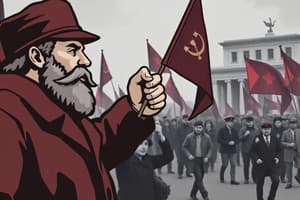Podcast
Questions and Answers
Marxist theory was founded by French philosopher Karl Marx.
Marxist theory was founded by French philosopher Karl Marx.
False (B)
According to Marxist theory, history is primarily about struggles between social classes.
According to Marxist theory, history is primarily about struggles between social classes.
True (A)
In Marxist theory, the bourgeoisie owns the means of production, while the proletariat profits from their labor.
In Marxist theory, the bourgeoisie owns the means of production, while the proletariat profits from their labor.
False (B)
Alienation is not a key concept in Marxist theory.
Alienation is not a key concept in Marxist theory.
Marxist theory emerged as a response to the agricultural revolution.
Marxist theory emerged as a response to the agricultural revolution.
Workers are alienated from themselves in Marxist theory as they sell their time and labor.
Workers are alienated from themselves in Marxist theory as they sell their time and labor.
Marxist literary criticism only focuses on analyzing the economic base of society.
Marxist literary criticism only focuses on analyzing the economic base of society.
In the capitalist system, workers are closely connected to the outcomes of their labor.
In the capitalist system, workers are closely connected to the outcomes of their labor.
Marxist literary theory examines social context but does not consider class struggles in literary works.
Marxist literary theory examines social context but does not consider class struggles in literary works.
According to Marxist theory, class struggle plays a significant role in shaping history.
According to Marxist theory, class struggle plays a significant role in shaping history.
Marxist theory is a simplistic approach that does not offer a nuanced understanding of society.
Marxist theory is a simplistic approach that does not offer a nuanced understanding of society.
Criticism of Marxist theory has led to its diminished relevance in literary analysis.
Criticism of Marxist theory has led to its diminished relevance in literary analysis.
Flashcards are hidden until you start studying
Study Notes
Marxist Theory: Understanding the Theory of Class Struggle
Introduction
Marxist theory, founded by German philosopher Karl Marx, is a social and economic theory that analyzes the class struggle within society. It emphasizes the relationship between the economic base and the social superstructure, viewing history as the story of class struggles between the ruling class and the working class. This article will delve into the key concepts of Marxist theory, including its historical context, the concept of alienation, and its application to literature and literary criticism.
Historical Context
Marxist theory emerged in the mid-nineteenth century as a response to the industrial revolution and the rise of capitalism. Marx believed that history was essentially the story of different classes in society and their struggles and conflicts. He divided humanity into two social classes: the proletariat (working class) and the bourgeoisie (capitalist class). The proletariat, who did not own the means of production, were exploited by the bourgeoisie, who owned the means of production and profited from their labor.
Alienation
One of the key concepts in Marxist theory is the idea of alienation. According to Marx, workers become alienated from their labor and the products of their labor. They are also alienated from themselves, as they sell their time and labor, reducing themselves to a commodity. This alienation is not just from the material products but also from the social relations and the very essence of their labor. In the capitalist system, the worker is disconnected from the results of their labor, contributing to their sense of alienation.
Marxist Literary Criticism
Marxist literary theory and criticism analyze literature from a Marxist perspective. It pays attention to the relations between the base and the superstructure, emphasizing that the economic base influences the social, political, and cultural superstructure. Marxist literary theory examines the social context and class struggles in literary works, often focusing on the representation of class and its impact on the narrative.
Conclusion
Marxist theory is a complex and nuanced approach to understanding society and its history. It provides a framework for analyzing the relationship between economic structures and social relations, highlighting the importance of class struggle in shaping history. While it has been subject to criticism, it remains a significant lens through which to examine literature and the world around us.
Studying That Suits You
Use AI to generate personalized quizzes and flashcards to suit your learning preferences.




